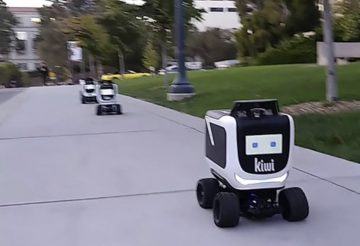Stephen T Asma in Aeon:
 When Alexa replied to my question about the weather by tacking on ‘Have a nice day,’ I immediately shot back ‘You too,’ and then stared into space, slightly embarrassed. I also found myself spontaneously shouting words of encouragement to ‘Robbie’ my Roomba vacuum as I saw him passing down the hallway. And recently in Berkeley, California, a group of us on the sidewalk gathered around a cute four-wheeled KiwiBot – an autonomous food-delivery robot waiting for the traffic light to change. Some of us instinctively started talking to it in the sing-song voice you might use with a dog or a baby: ‘Who’s a good boy?’
When Alexa replied to my question about the weather by tacking on ‘Have a nice day,’ I immediately shot back ‘You too,’ and then stared into space, slightly embarrassed. I also found myself spontaneously shouting words of encouragement to ‘Robbie’ my Roomba vacuum as I saw him passing down the hallway. And recently in Berkeley, California, a group of us on the sidewalk gathered around a cute four-wheeled KiwiBot – an autonomous food-delivery robot waiting for the traffic light to change. Some of us instinctively started talking to it in the sing-song voice you might use with a dog or a baby: ‘Who’s a good boy?’
We’re witnessing a major shift in traditional social life, but it’s not because we’re always online, or because our tech is becoming conscious, or because we’re getting AI lovers like Samantha in Spike Jonze’s film Her (2013). To the contrary, we’re learning that humans can bond, form attachments and dedicate themselves to non-conscious objects or lifeless things with shocking ease. Our social emotions are now being hijacked by non-agents or jabbering objects such as Amazon’s Alexa, Apple’s Siri or IBM’s Watson, and we’re finding it effortless, comfortable and satisfying.
The sophistication level of human-like simulation that AI needs in order to elicit our empathy and emotional entanglement is ridiculously low.
More here.
